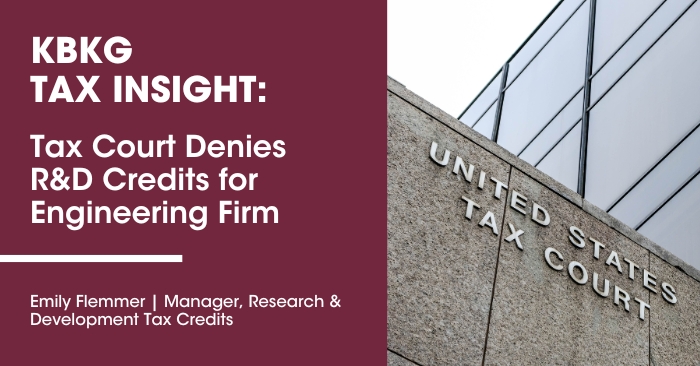By Emily Flemmer | Manager, Research & Development Tax Credits
In the case of Meyer, Borgman & Johnson, Inc. v. Commissioner No. 23-1523 (8th Cir. May 6, 2024), the U.S. Court of Appeals for the Eighth Circuit upheld the Tax Court’s decision denying research tax credits to a structural engineering firm because the taxpayer’s research was deemed to be “funded.”
The taxpayer sought research tax credits totaling approximately $190,000 for expenses related to structural designs in building projects. However, the IRS denied these credits. The Tax Court ruled in favor of the IRS, stating that the taxpayer’s research was considered “funded” within the meaning of section 41(d)(4)(H). This provision indicates that if research is funded by a grant, contract, or another entity, the taxpayer is not eligible for any associated research tax credits.
KBKG Insight:
Despite the tax court denying R&D credits in this particular case, there are many instances where engineering firms qualify for R&D tax credits. For example, an engineering firm working with clients where the contract terms provide they have rights and risks associated with their work can be eligible. Engineering firms conducting research and adhering to proper documentation standards, as outlined below, can successfully claim R&D credits. KBKG recommends all engineering firms seek assistance from a third-party expert to review their contracts to see if they qualify.
Meyer, Borgman & Johnson, Inc. argued that its right to payment for research was not funded because it was “contingent on the success of the research” under Treas. Reg. section 1.41-4A(d)(1). They claimed that under their contracts, they had to create designs that met specific criteria and complied with codes and regulations, and that payment was contingent on fulfilling those requirements.
However, both the Tax Court and the Eighth Circuit disagreed with the taxpayer’s interpretation. They found that while the contracts involved economic risk, payment was not contingent on the success of the research itself.
Additionally, the taxpayer argued that inspection, acceptance, and quality assurance provisions in their contracts, as well as multiple project phases with client approval, meant payment was contingent on the success of the research. However, the courts found these provisions lacked the specificity required to qualify as contingent payments.
KBKG Insight:
In cases where engineering work does not fall within the definition of “funded”, engineering firms can qualify for R&D credits when engaging in activities that meet the IRS’s four-part test for qualified research:
1. Technological in Nature: The activity must rely on principles of physical or biological sciences, engineering, or computer science.
2. Permitted Purpose: The activity must relate to new or improved business components, aiming to improve performance, function, reliability, or quality.
3. Elimination of Uncertainty: The activity must intend to eliminate uncertainty regarding the development or improvement of a product or process.
4. Process of Experimentation: The activity must include a process of experimentation, such as evaluating alternatives or testing hypotheses.
This has been confirmed by other tax court cases, including Geosyntec Consultants, Inc. v. Commissioner, where the court upheld R&D credits for qualified research activities carried out by the engineering firm. The court emphasized the importance of maintaining comprehensive and contemporaneous documentation to substantiate R&D tax credit claims. Geosyntec successfully presented detailed documentation of their research activities, including project reports, testing data, and records of experiments. The court ruled in favor of Geosyntec for a significant portion of the disputed credits, affirming that their activities qualified as research under the R&D tax credit guidelines.
The Meyer, Borgman & Johnson, Inc. v. Commissioner No. 23-1523 case emphasizes the risks of not using a reputable R&D Credit firm with significant experience in the engineering industry. KBKG’s team includes nationally recognized experts with over 300 years of combined experience. With a proven track record of over 25 years, KBKG is trusted by thousands of CPAs through our local offices across the country.
Contact KBKG today for a free review of your information to see if you qualify.
About the Author
Emily Flemmer | Manager – Research & Development Tax Credits
Emily Flemmer is a Manager with KBKG working for the Research and Development (R&D) Tax Credit department. She has over seven years of consulting experience providing federal and state R&D credit services to companies in a variety of industries. Her relevant industry experience includes but is not limited to software development, retail, aerospace and defense, manufacturing, automotive, and pharmaceuticals. Read More



